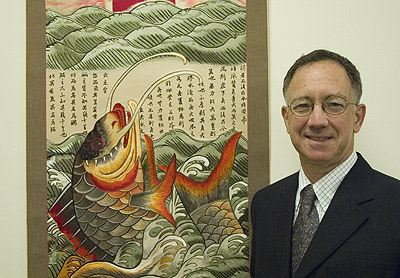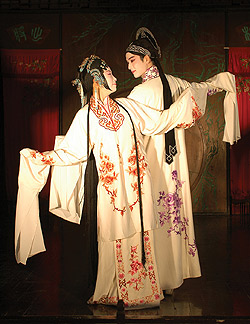Berkeleyan
 |
Sociology professor Tom Gold, who began studying Chinese as an undergraduate at Oberlin, wants to help make Berkeley a leader in China scholarship. (Deborah Stalford photo) |
China scholarship, writ large
From investments to oracle bones, the Berkeley China Initiative aims to span disciplines, cultures, and perspectives
![]()
| 04 October 2006
When a new adaptation of the 400-year-old opera The Peony Pavilion arrived at Zellerbach Hall last month, critics proclaimed it an artistic triumph. But it was more than that. The production's U.S. premiere marked a triumph of a different sort for the one-year-old Berkeley China Initiative, an ambitious, multi-faceted effort to boost the Berkeley campus into the forefront of Chinese knowledge and understanding.
Sociologist Tom Gold, the veteran China scholar who heads the initiative, recalls Cal Performances' initial doubts about filling seats for a three-night, nine-hour classical Chinese opera when the BCI first suggested it book the tour. "We said, yeah, we can do it," Gold says. "We told them we'd build auxiliary programs around it to help people appreciate what they were going to be seeing," and enlisted an off-campus BCI adviser, exporter David Lei, to help pump up attendance. "He mobilized the Chinese community, and it sold out. We had people coming from Taiwan, from Seattle, from Los Angeles, from New York" -even, Gold laughs, from the South Bay.
"We worked very well together," he says about partnering with CalPerfs. "We see this as a model for the sort of thing the Berkeley China Initiative can do, which is to draw together campus resources for all of our benefit. People were just glowing, walking on air. The response was astounding."
Creating buzz, in fact, was a prime objective of the BCI during its first year of existence, which included a number of what Gold terms "very large, showy programs" as a means of building a community of scholars and China hands in and around the Bay Area. Its first program, held at International House in March, was a conference on venture capital and private-equity investing in China; in July, educators and business leaders gathered at I-House again to explore the need for Chinese-language speakers in an increasingly global workforce. The latter event was aided by a small but "symbolic" grant from the Chinese consulate.
 An artistic triumph, The Peony Pavilion was also a model for mobilizing the campus's resources around China studies. (Courtesy Cal Performances) |
Bridging those two conferences was the two-day China-U.S. Climate Change Forum, for which the BCI collaborated with the Graduate School of Journalism and Lawrence Berkeley National Laboratory. Featured speakers included the Rocky Mountain Institute's Amory Lovins, Global Business Network founder and chairman Peter Schwartz, and venture capitalist Ta-Lin Hsu, along with a constellation of campus stars like LBL's Steve Chu and economist George Akerloff, both Nobel laureates.
Orville Schell, dean of the J-School and the author of nine books on China, observed from the podium that the meeting was a "high-on-the-periodic-table gathering of people," an assessment with which no one could seriously argue. Gold credits Schell, who serves on BCI's advisory board, for the spectacular success of the conference, and praises the school's Asia Pacific Project, which posts Asia-related reporting by Berkeley journalism students, as "an absolute gem."
At least 70 Berkeley faculty members are already working on issues related to China - not just the People's Republic but Taiwan, Hong Kong, Macau, and the so-called Chinese diaspora - "many of whom," adds Gold, "have not been part of the traditional China-studies community, and many of whom I'd never met" before launching the BCI last fall. The School of Public Health, for example, is doing "extraordinary research" on such scourges as SARS, HIV/AIDS, and schistosomiasis (also known as "snail fever"). Faculty from a number of different departments are deeply involved in researching environmental and energy issues - a major area of mutual concern between China and the U.S. - and many are working in the policy realm here and in Asia.
"We have so much talent and so much knowledge on campus, and one of the things we want to do is to tap into it, to bring it together to establish all sorts of opportunities for cross-fertilization, so that people are talking to each other," Gold explains. The aimed-for synergy extends beyond the campus to the greater Bay Area, home to a wide array of people with experience in China as researchers, lawyers, doctors, artists, venture capitalists, and consultants.
And now, after a year of generating buzz, Gold is bent on raising funds to make the most of existing resources, and to attract still more - money for faculty, events, graduate fellowships, undergraduate study in China, stepped-up research support, and other "big dreams," the biggest of which is making the Berkeley campus "the preeminent site for China studies" in the nation.
'Feeling for the stones'
Chinese studies have a long and distinguished history at Berkeley, dating back to 1872 and the creation of the campus's first endowed chair, the Agassiz Professorship of Oriental Languages and Literature. Today some 40 percent of undergrads and roughly 17 percent of graduate students are Asian American, and nearly 400 students hail from China. More than 100 Berkeley students each year head to mainland China, Hong Kong, and Taiwan through exchange programs.
And the links between the U.S. and China - from trade and investment to air pollution - have never been stronger. ("They say that something like 25 percent of the particulates in the air in L.A. on any given day come from China," says Gold.) China, meanwhile, "is in transition, and they don't have a blueprint for where they're going. When the Communist Party had a much firmer grasp on Chinese society, they planned the economy and they tried to plan the society and arrange everybody's life all the way down to the bedroom. And now they realize they tried to do too much and they really messed up in a lot of ways, and they're backing off.
"They use the phrase 'crossing the river by feeling for the stones.' They're improvising as fast as they can. And so far they've done a remarkable job, which has attracted the attention of most of the world. Where's it going to go? They don't know. That's part of what many of us are involved in - trying to understand that."
Yet for all the attention lavished on China here at Berkeley, Gold says, a number of universities - many of them private schools like Harvard, Stanford, Chicago, Yale, and Cornell, but a few publics as well - have made far greater financial commitments to China studies. Correcting that imbalance is at the core of the Berkeley China Initiative.
"A year ago, [dean of International and Area Studies] John Lie and I were just talking about opportunities that had not really been utilized to the fullest, and how our China programs were vastly underfunded compared to our peer institutions. I mean vastly: underlined, bold, italics. But we have about the most active China program with the least amount of money of almost any China center in the country, or the world."
To rectify that financial imbalance, Lie, then in his second year as IAS dean, created the Berkeley China Initiative, and asked Gold to lead it, giving him the title of associate dean to indicate the effort's high-level support. Adds Gold - who started studying Chinese nearly 40 years ago as an undergrad at Oberlin and, as a Harvard doctoral candidate, lived in Shanghai as part of the first government-sponsored group of exchange students in 1979-80 - "I accepted the challenge, and have just been improvising as fast as I can."
"We're feeling our way, crossing the river by feeling for the stones," he says. "We're very Chinese in that way."
Gold works closely with Kevin O'Brien, the chair of the Center for Chinese Studies, in administering the initiative, which takes an expansive view of the term "Chinese scholar" - as evidenced by its external advisory committee, made up of experts whose credentials may be more real-world than purely academic. ("We in the university have so much to learn from them, and they have so much to learn from us," Gold says.) The BCI may be "feeling for the stones," but its long-term strategy for making Berkeley the leader in China studies is all about building bridges.
"The concept of the Berkeley China Initiative is China writ large," Gold says. "It's an effort to raise the profile of China studies on campus in all departments, disciplines, and professional schools. Some people might think, well, this is just a social-science project, but it's not. The arts, the humanities, and history are as deeply integrated as the social sciences and the professional schools. We're as interested in ancient history and oracle bones as we are in the People's Liberation Army and contemporary popular culture, and inequality and environmental issues."
Such intertwining connections echo those between China and the U.S. "There are areas where we can collaborate very, very closely, such as environmental issues, and there are areas - human rights, information, intellectual property, rule of law - where our relationships are very complex," says Gold. "But we have to continue to find ways to work together to solve problems facing our societies - separately and jointly - and the world, because our impact on the world stage is so great."
In that journey of a thousand miles, The Peony Pavilion is merely a first step.

